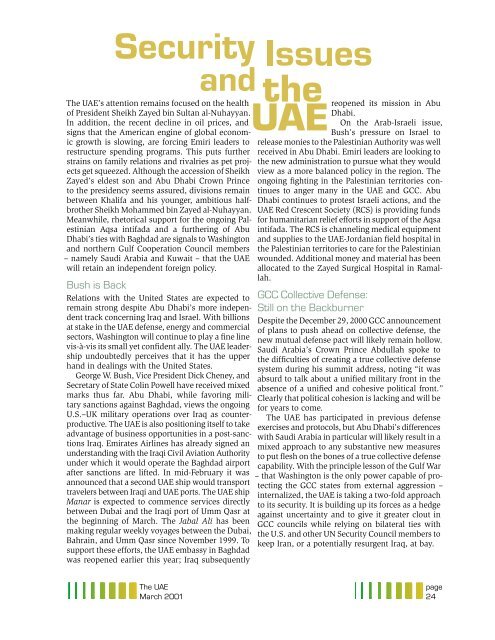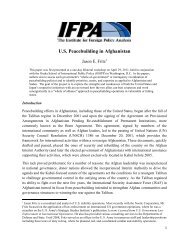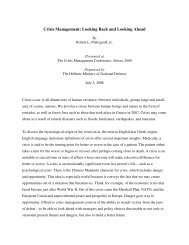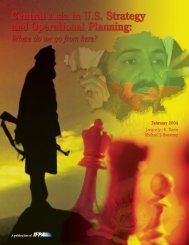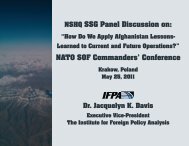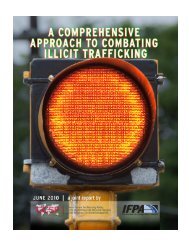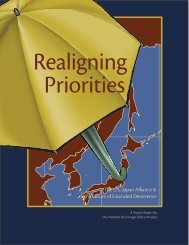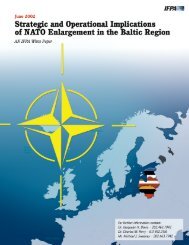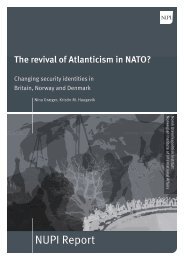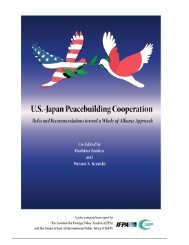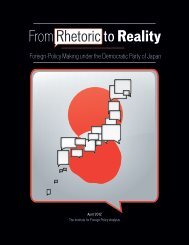March 2001 - Institute for Foreign Policy Analysis
March 2001 - Institute for Foreign Policy Analysis
March 2001 - Institute for Foreign Policy Analysis
Create successful ePaper yourself
Turn your PDF publications into a flip-book with our unique Google optimized e-Paper software.
The UAE’s attention remains focused on the health<br />
of President Sheikh Zayed bin Sultan al-Nuhayyan.<br />
In addition, the recent decline in oil prices, and<br />
signs that the American engine of global economic<br />
growth is slowing, are <strong>for</strong>cing Emiri leaders to<br />
restructure spending programs. This puts further<br />
strains on family relations and rivalries as pet projects<br />
get squeezed. Although the accession of Sheikh<br />
Zayed’s eldest son and Abu Dhabi Crown Prince<br />
to the presidency seems assured, divisions remain<br />
between Khalifa and his younger, ambitious halfbrother<br />
Sheikh Mohammed bin Zayed al-Nuhayyan.<br />
Meanwhile, rhetorical support <strong>for</strong> the ongoing Palestinian<br />
Aqsa intifada and a furthering of Abu<br />
Dhabi’s ties with Baghdad are signals to Washington<br />
and northern Gulf Cooperation Council members<br />
– namely Saudi Arabia and Kuwait – that the UAE<br />
will retain an independent <strong>for</strong>eign policy.<br />
Bush is Back<br />
Relations with the United States are expected to<br />
remain strong despite Abu Dhabi’s more independent<br />
track concerning Iraq and Israel. With billions<br />
at stake in the UAE defense, energy and commercial<br />
sectors, Washington will continue to play a fine line<br />
vis-à-vis its small yet confident ally. The UAE leadership<br />
undoubtedly perceives that it has the upper<br />
hand in dealings with the United States.<br />
George W. Bush, Vice President Dick Cheney, and<br />
Secretary of State Colin Powell have received mixed<br />
marks thus far. Abu Dhabi, while favoring military<br />
sanctions against Baghdad, views the ongoing<br />
U.S.–UK military operations over Iraq as counterproductive.<br />
The UAE is also positioning itself to take<br />
advantage of business opportunities in a post-sanctions<br />
Iraq. Emirates Airlines has already signed an<br />
understanding with the Iraqi Civil Aviation Authority<br />
under which it would operate the Baghdad airport<br />
after sanctions are lifted. In mid-February it was<br />
announced that a second UAE ship would transport<br />
travelers between Iraqi and UAE ports. The UAE ship<br />
Manar is expected to commence services directly<br />
between Dubai and the Iraqi port of Umm Qasr at<br />
the beginning of <strong>March</strong>. The Jabal Ali has been<br />
making regular weekly voyages between the Dubai,<br />
Bahrain, and Umm Qasr since November 1999. To<br />
support these ef<strong>for</strong>ts, the UAE embassy in Baghdad<br />
was reopened earlier this year; Iraq subsequently<br />
reopened its mission in Abu<br />
Dhabi.<br />
On the Arab-Israeli issue,<br />
Bush’s pressure on Israel to<br />
release monies to the Palestinian Authority was well<br />
received in Abu Dhabi. Emiri leaders are looking to<br />
the new administration to pursue what they would<br />
view as a more balanced policy in the region. The<br />
ongoing fighting in the Palestinian territories continues<br />
to anger many in the UAE and GCC. Abu<br />
Dhabi continues to protest Israeli actions, and the<br />
UAE Red Crescent Society (RCS) is providing funds<br />
<strong>for</strong> humanitarian relief ef<strong>for</strong>ts in support of the Aqsa<br />
intifada. The RCS is channeling medical equipment<br />
and supplies to the UAE-Jordanian field hospital in<br />
the Palestinian territories to care <strong>for</strong> the Palestinian<br />
wounded. Additional money and material has been<br />
allocated to the Zayed Surgical Hospital in Ramallah.<br />
GCC Collective Defense:<br />
Still on the Backburner<br />
Despite the December 29, 2000 GCC announcement<br />
of plans to push ahead on collective defense, the<br />
new mutual defense pact will likely remain hollow.<br />
Saudi Arabia’s Crown Prince Abdullah spoke to<br />
the difficulties of creating a true collective defense<br />
system during his summit address, noting “it was<br />
absurd to talk about a unified military front in the<br />
absence of a unified and cohesive political front.”<br />
Clearly that political cohesion is lacking and will be<br />
<strong>for</strong> years to come.<br />
The UAE has participated in previous defense<br />
exercises and protocols, but Abu Dhabi’s differences<br />
with Saudi Arabia in particular will likely result in a<br />
mixed approach to any substantive new measures<br />
to put flesh on the bones of a true collective defense<br />
capability. With the principle lesson of the Gulf War<br />
– that Washington is the only power capable of protecting<br />
the GCC states from external aggression –<br />
internalized, the UAE is taking a two-fold approach<br />
to its security. It is building up its <strong>for</strong>ces as a hedge<br />
against uncertainty and to give it greater clout in<br />
GCC councils while relying on bilateral ties with<br />
the U.S. and other UN Security Council members to<br />
keep Iran, or a potentially resurgent Iraq, at bay.<br />
The UAE<br />
<strong>March</strong> <strong>2001</strong><br />
page<br />
24


